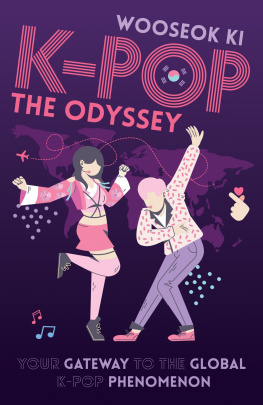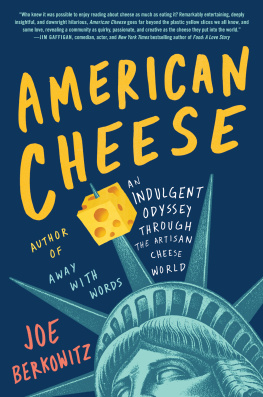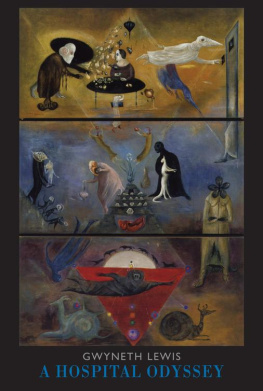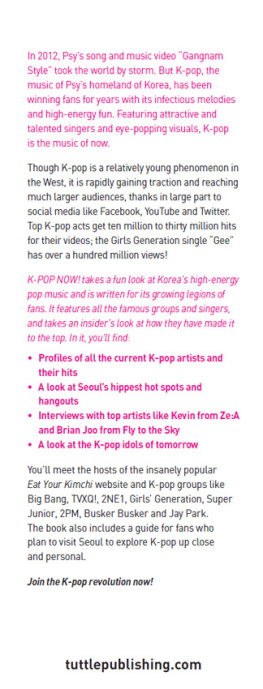Contents
Part 1
What is K-Pop?
CHAPTER 1
K-Pop as a Music Genre
CHAPTER 2
K-Pop as an Industry
CHAPTER 3
K-Pop as a Culture
Part 2
Globalization
CHAPTER 4
Started from South Korea, Now We Here
CHAPTER 5
Knocking on Neighbors Doors in Greater Asia
CHAPTER 6
Westward Bound
CHAPTER 7
Psy and Gangnam Style
CHAPTER 8
The 2010s : A Decade of Possibilities
CHAPTER 9
A New Era : 2020 and Beyond
Part 3
Online Technology and Content
CHAPTER 10
The Online vs. Offline Strategy
CHAPTER 11
The Technology Evolved, and So Did the Fans
CHAPTER 12
Where, When, and How : Social Media Platforms
CHAPTER 13
The Untact Era
CHAPTER 14
Diversity of Content : Third-Party Creators
Part 4
The Idol System
CHAPTER 15
The Trainee
CHAPTER 16
The Debut
CHAPTER 17
The Breakthrough
CHAPTER 18
K-Pops Social Issues and Need for Reform
Part 5
The Music
CHAPTER 19
Musical Influences
CHAPTER 20
How are Hit K-Pop Songs and Albums Made?
CHAPTER 21
Lyrics : I Dont Know What Theyre Saying, But I Love It
Part 6
The Business Side
CHAPTER 22
The Current Scene
CHAPTER 23
Global Strategic Partnerships
CHAPTER 24
Alternative Sources of Revenue
Part 7
The Fandom Culture
CHAPTER 25
The Artist and the Fan
CHAPTER 26
South Korea and the World
CHAPTER 27
The Lasting Legacy
CHAPTER 28
The Other Fan
Part 8
The Future Outlook
CHAPTER 29
The Odyssey of Henry Lau
CHAPTER 30
Whats Next?
Authors Note
Welcome to the odyssey.
In Greek mythology, the Odyssey is the story of Trojan War hero, Odysseus, who after a ten-year war, encounters another decade of adventures and setbacks on his way home. I wont spoil the ending in case you want to check it out.
In a lot of ways, K-Pop has a parallel story; it has had no predictable progression of events but rather a series of trials and tribulations. A lot of things worked out but some just didnt. Unexpected game-changers happened frequently. The modern idea of K-Pop as we know it today spans at least two and a half decades, so how can a single news outlet condense all these fascinating stories into just a one-page article? Or just one YouTube video?
Its only relatively recently that weve seen Korean pop culture spread so vastly outside of its homeland; it started to make an impact in a major way during the late 1990s and early 2000s in Greater Asia. Initially, it was difficult for Korean pop culture to challenge the existing pop cultural paradigm because historically, the West has dominated this arena with staples such as Hollywood, Billboard, and the Grammys. Additionally, the nearby Chinese and Japanese markets had their own intricate pop cultural products: Chinese cinema, anime, and their respective pop industries. One way or another, however, K-Pop eventually spread and captured the global audience.
As a Korean American who has navigated both countries almost equally, I love seeing cultural diffusion. I get excited whenever I see people engage with and enjoy a cultural aspect or tradition that I hadnt expected them to. You can imagine my delight when I learned that my non-Korean classmates from places like New Jersey and Hong Kong had discovered and enjoyed K-Pop, either on their own or through a Korean mediator.
When I moved to the U.S. from Seoul as an eight-year-old, I missed seeing my favorite Korean singers on TV. The artists in my new country looked and dressed differently than Korean stars on music TV shows, and I could only memorize pop songs by their melodies because I couldnt understand the English lyrics. Even as I gradually began to embrace Western pop culture, I still wished for an Asian role modela chill, trendy one that I could brag to my American friends about. Jackie Chan was my go-to for a while, since he was not only a badass but a household name. Yet, as great as the Rush Hour movies were, Chan is from Hong Kong, not South Korea. Plus, he was getting old! The fact that I had no Korean icon to automatically resort to was disheartening.
Fortunately, thanks to YouTubes popularity a few years later, I was able to reconnect with Korean pop musicwhich was newly heralded as K-Popand dive into a spiral of endless videos from acts like TVXQ and BIGBANG. I always wondered to myself, What if these guys were to perform on a bigger platform like MTV or the Grammys?
Years later, I started at UC Berkeley in Fall 2012 as a clueless freshman. Serendipitously, this was around the same time that a track called Gangnam Style was released. Then, things changed.
I had partied to this song all summer long on the streets of Gangnam District in Seoul right before my first semester at Berkeley. At karaoke bars, my friends and I would chant, OPPAN GANGNAM STYLE! before erupting into crazy dance routines, as everyone else did in Korea that summer.
Never did I expect to hear Gangnam Style blasting from a loudspeaker on my first day on the huge Berkeley campus.
What was going on here? Why were they playing this song in faraway America? The lyrics werent even in English! But here in Berkeley, I saw people vibing, hopping along to the bouncy rhythm, and chanting, OPPAN GANGNAM STYLE! just like I had done in Gangnam.
Apparently, the Gangnam Style phenomenon was not only taking offit was soaring. As its YouTube video view count kept rising, the singer, Psy, began to appear on American media like The Ellen DeGeneres Show and the MTV Video Music Awards. The term K-Pop became a frequent identifier on media headlines, and it increasingly attracted more and more global eyes. What I had imagined to be largely self-contained to Korea or maybe even to Asia was already being recognized by those all over the world. It was certainly fascinating to see K-Pop elevating to a global platform. At the same time, I thought, Man, I wonder if well ever have something like Gangnam Style again.
Since I attended a college with a student body of roughly 30,000 and a huge minority of Asian studentsroughly 30 percentit wasnt hard to find others interested in K-Pop. I was able to connect with many peers who celebrated the music and culture.
At the time, I thought it was only natural that K-Pop was becoming more global; members of the Millennial generation were living in the age of social media and heightened globalization. Thanks to the internet, it has become very easy to share music and content surrounding these K-Pop stars, and the Korean entertainment companies were very aware of this. More K-Pop artists like Super Junior, BIGBANG, and 2NE1 began to engage in worldwide tours, incorporated English lyrics or foreign-language-speaking members, and began working with international music producers and dance choreographers.










